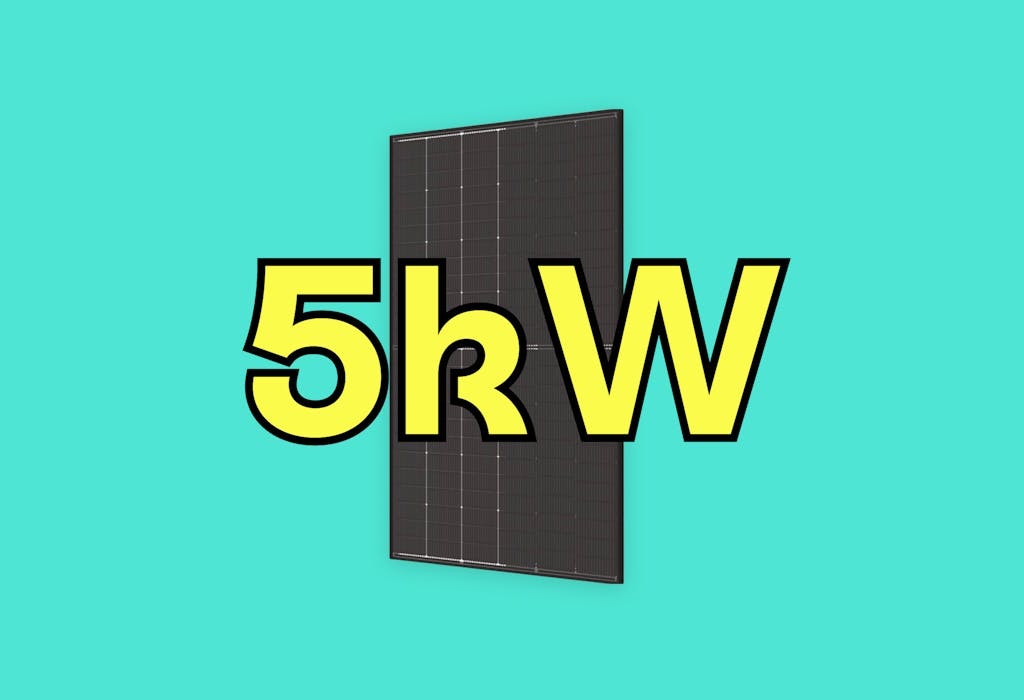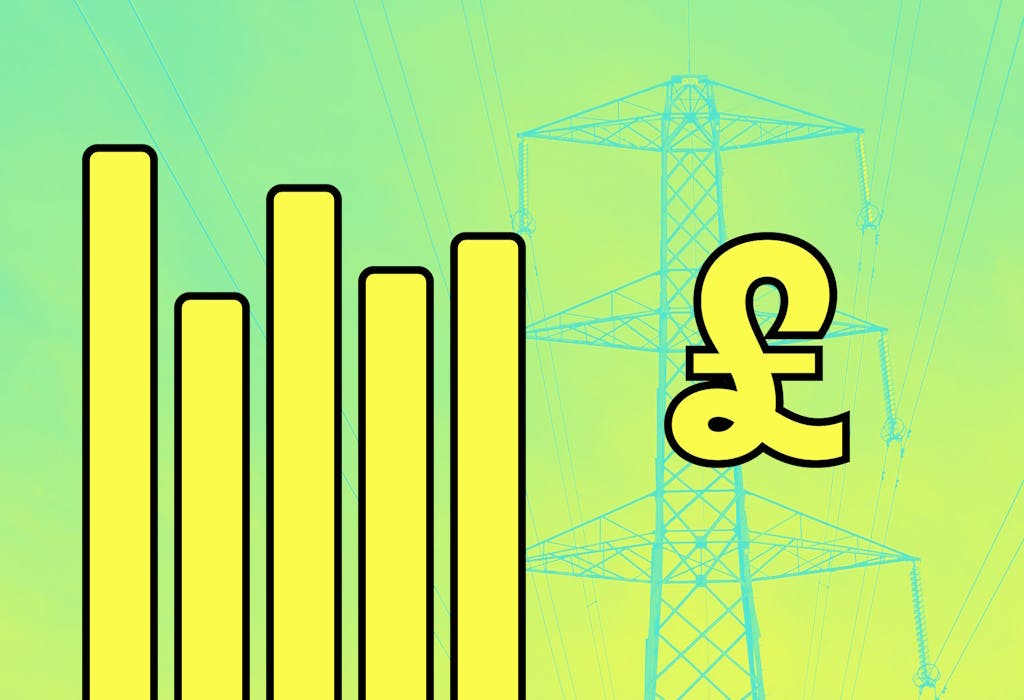- Solar advice hub
- System-size
- 4 reasons to get a larger solar panel system
4 reasons to get a larger solar panel system
A larger solar panel system will boost your export profits, protect you against energy price rises, and future-proof your home.


Why you can trust our content
We know that the solar industry is full of misinformation, but we only use reliable sources, including:
- Our experienced solar experts, installers and system designers
- Our own database of solar & battery system designs
- Authoritative bodies like MCS and the UK government




Calculate savings
What kind of home do you live in?
Calculate savings
What kind of home do you live in?
At a glance
When you’re switching to solar, it's worth getting as large a solar panel system as you can.
If you get an ‘oversized system’, you’ll generate more solar electricity than you need, which you can sell to the grid to reduce your electricity bills even further.
With export tariffs only getting more profitable for domestic customers, the more panels you get, the more you’ll save – especially as extra panels don’t add much to your overall cost.
And with systems lasting upwards of 30 or even 40 years, you’ll be protected against energy price rises and prepared for your future – whether that involves an electric car, heat pump, air conditioning, or new additions to your household.
Let’s run through the key reasons to oversize your solar panel system.
Find out how much you can save
What kind of home do you live in?
1. The majority of the cost doesn’t change
When you’re paying for a solar & battery installation, the majority will go on scaffolding, inverter, cables, and labour.
These are all fixed expenses, which means no matter the size of your system, you’ll pay more or less a set amount for these things.
The labour cost will increase slightly as your system gets bigger, but you’d have to add a huge number of panels to raise this figure by a significant amount.
And every solar panel you tack on to your system will of course raise the hardware cost by a bit more, but it’ll be worth it.
After all, the savings each one generates by providing free electricity that you can use and sell to the grid will quickly outweigh this extra expense.
Most solar panel installers will size a system according to your usage, and that setup can be extremely beneficial – but thanks to increasingly generous solar export tariffs, it’s now worth getting as big a system as you can.
The more panels you put on your roof, the more money you’ll save – so it makes sense to get as many as possible, even if that means getting some panels on your garage roof.
It pays to get all your panels installed at once as well, since adding more panels later on will require you to pay the fixed costs all over again, and may present technical challenges.
2. You can benefit from lucrative export tariffs
Your outsized solar & battery system will generate more electricity than you can use – which is perfect, since we’ve entered a new era of competitive, money-spinning solar export tariffs.
You can now sell your excess electricity through tariffs like Intelligent Octopus Flux, which pays the same rate for exported electricity as it charges you to import electricity.
Unlike old-fashioned export tariffs, this means your solar electricity will save you the same amount on your energy bills at any given time, whether you use it or sell it to the grid.
And since your solar panels are generating this electricity for free, selling it on a tariff like this will earn you massive profits – and the bigger your system, the more you’ll be able to export.
Intelligent Octopus Flux comes with such a high export rate because it’s a smart tariff that gives Octopus control of your battery.
This allows Octopus to import grid electricity to your battery during times when it’s cheaper for the company to buy from the grid, and export electricity to the grid at high-demand times, when it’s more profitable.
The tariff also encourages households to shift their electricity usage away from the peak time of 4-7pm, when grid electricity is most expensive.
Octopus profits from this strategy in the same way you do, so it shares the spoils.

By gaining access to batteries all over the country, the company is also able to benefit from initiatives like the (Demand Flexibility Service (DFS), which pay suppliers that successfully encourage customers to use less electricity during high-demand periods.
Octopus was the first to create such a generous tariff, but other energy suppliers are set to release similar smart tariffs in order to be competitive in this space – which is excellent news for solar homes.
If you want to see the best Smart Export Guarantee rates, check our regularly updated guide.
3. Prepare for the future
The future is electric, so generating as much electricity as you can will only get more profitable over the coming decades, as it’s used to power most parts of your life.
In an effort to cut the UK’s carbon emissions and transition to a cheaper way of powering the transport, building, and heating sectors, the government is replacing fossil fuels with renewable electricity.
This will lead to a massive increase in our electricity consumption, with the UK set to experience a 50% rise in electricity demand by 2035, according to the independent Climate Change Committee (CCC).
UK electricity consumption forecast, 2020-2050
Electric cars and heat pumps are at the forefront of this technological shift, as shown by their rapid surges in popularity over the past few years.
In the space of four years, we’ve gone from EVs making up 11% of new car sales, to their current rate of 28%, as of June 2024.
There are now more than 1.1 million battery-electric vehicles across the country, a figure which must increase to 25 million by 2035, if the UK is to keep its own target.
And heat pump sales are soaring too, having grown in each of the past six years and hit new heights in 2023, when 60,000 were sold.
This figure is poised to keep climbing, as the government offers grants like the £7,500 Boiler Upgrade Scheme in order to reach its target of 600,000 installations per year by 2028.
Solar electricity can power both of these technological innovations, as well as air conditioning, which will likely become more attractive as climate change intensifies.
And if you’re thinking of increasing the size of your household at some point in the next few decades – perhaps with a new child, elderly relative, or lodger – then a large solar & battery system can soften or even negate the blow of higher electricity consumption.
It’s best not to wait until your usage increases to add more panels, as it’ll be more expensive and potentially quite complicated, and you’ll miss out on all the savings you’d pick up before then.
So whether you sell it to the grid, channel it into powering your new EV, heat pump, and air conditioning system, or simply need it to satisfy the demands of a larger household, getting a system that generates excess solar electricity is a safe bet looking forward.
You can see the kind of yearly expenses you’d be saving yourself from in the table below.
| Electrical device | Annual electricity usage (kWh) | Annual cost* |
|---|---|---|
| Typical household usage | 3,400 | £875 |
| Heat pump | 3,200 | £823 |
| EV charger | 2,118 | £545 |
| Air conditioning | 2,500 | £643 |
| Total | 11,218 | £2,886 |
* Based on the July 2025 price cap
4. Boost your property’s value
If you’re not sure about filling your roof with solar panels because you think you may move at some point, we’ve got good news.
A solar & battery system can increase the value of your home, according to Rightmove’s 2023 study of 300,000 properties.
This is because it’ll typically raise your property's Energy Performance Certificate (EPC) rating by a grade (at least), which will boost your home’s value. The study found that increasing a property's EPC from a D to a C resulted in an average increase of 3%, or £11,157.
And an oversized solar & battery system that produces particularly large savings may have an even more substantial effect on your sale price.
Plus, until you sell up, your big solar & battery system will keep saving you money and returning handsomely on your investment.
Next steps
Most households could seriously benefit from getting a large solar panel system.
What would’ve seemed like an unnecessarily oversized system a few years ago is now your best bet for the next few decades.
It’ll allow you to make the most of increasingly generous export tariffs, cut your electricity bills now and in our electrified future, and raise your home’s value.
And since adding a few extra solar panels won’t have a large effect on the cost of your system, it’s well worth paying a little more to gain much more overall.
If you’d like to know how much you could save with a solar & battery system, enter a few details below and we’ll generate an estimate.
Find out how much you can save
What kind of home do you live in?
Related articles

Written byJosh Jackman
Josh has written about the rapid rise of home solar for the past six years. His data-driven work has been featured in United Nations and World Health Organisation documents, as well as publications including The Eco Experts, Financial Times, The Independent, The Telegraph, The Times, and The Sun. Josh has also been interviewed as a renewables expert on BBC One’s Rip-Off Britain, ITV1’s Tonight show, and BBC Radio 4 and 5.



